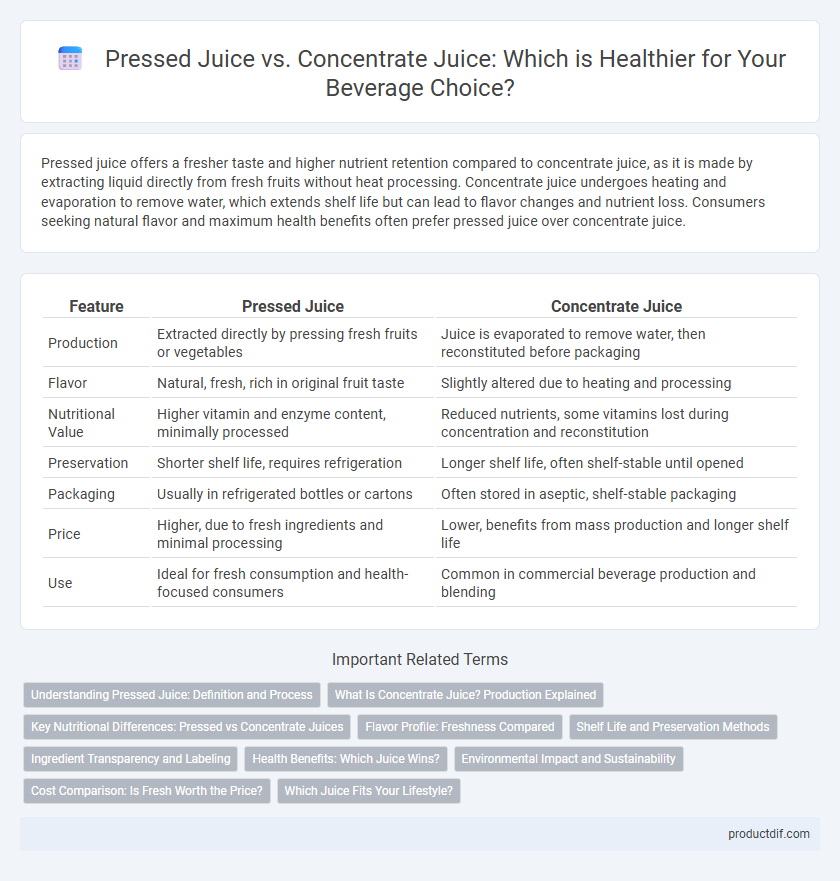Pressed juice offers a fresher taste and higher nutrient retention compared to concentrate juice, as it is made by extracting liquid directly from fresh fruits without heat processing. Concentrate juice undergoes heating and evaporation to remove water, which extends shelf life but can lead to flavor changes and nutrient loss. Consumers seeking natural flavor and maximum health benefits often prefer pressed juice over concentrate juice.
Table of Comparison
| Feature | Pressed Juice | Concentrate Juice |
|---|---|---|
| Production | Extracted directly by pressing fresh fruits or vegetables | Juice is evaporated to remove water, then reconstituted before packaging |
| Flavor | Natural, fresh, rich in original fruit taste | Slightly altered due to heating and processing |
| Nutritional Value | Higher vitamin and enzyme content, minimally processed | Reduced nutrients, some vitamins lost during concentration and reconstitution |
| Preservation | Shorter shelf life, requires refrigeration | Longer shelf life, often shelf-stable until opened |
| Packaging | Usually in refrigerated bottles or cartons | Often stored in aseptic, shelf-stable packaging |
| Price | Higher, due to fresh ingredients and minimal processing | Lower, benefits from mass production and longer shelf life |
| Use | Ideal for fresh consumption and health-focused consumers | Common in commercial beverage production and blending |
Understanding Pressed Juice: Definition and Process
Pressed juice is extracted by applying mechanical pressure to fresh fruits or vegetables, preserving natural flavors, nutrients, and enzymes without using heat. This cold-pressing process retains higher levels of vitamins and antioxidants compared to concentrate juice, which undergoes pasteurization and rehydration. The method ensures a fresher taste and smoother texture, appealing to health-conscious consumers seeking minimally processed beverages.
What Is Concentrate Juice? Production Explained
Concentrate juice is produced by removing the majority of water content from freshly pressed juice through vacuum evaporation, resulting in a thick, syrupy product that is easier to transport and has a longer shelf life. This process preserves the juice's essential flavors and nutrients while significantly reducing volume for storage and distribution. During reconstitution, water is added back to the concentrate to restore its original juice consistency before packaging and consumption.
Key Nutritional Differences: Pressed vs Concentrate Juices
Pressed juice retains more natural vitamins, minerals, and antioxidants because it undergoes minimal processing and no heat treatment, preserving delicate nutrients like vitamin C and enzymes. Concentrate juice often loses some nutrients through the heat and evaporation processes used to remove water, which can degrade heat-sensitive compounds and reduce overall nutritional value. Fiber content is also higher in pressed juice, supporting digestion and providing additional health benefits compared to most concentrate juices.
Flavor Profile: Freshness Compared
Pressed juice retains the natural flavor profile with vibrant, fresh fruit notes due to minimal processing, preserving essential nutrients and enzymes. Concentrate juice undergoes heat treatment and water removal, which often results in a less fresh, slightly cooked taste and diminished aromatic qualities. Consumers seeking a crisp, authentic flavor experience typically prefer pressed juice for its superior freshness and natural essence.
Shelf Life and Preservation Methods
Pressed juice typically has a shorter shelf life, lasting about 3 to 5 days when refrigerated due to minimal processing and the absence of preservatives. Concentrate juice undergoes pasteurization and water removal, extending its shelf life to several months or even years when sealed, thanks to reduced microbial activity and the use of preservatives. Preservation methods like refrigeration for pressed juice and aseptic packaging for concentrate juice are key factors in maintaining freshness and safety over time.
Ingredient Transparency and Labeling
Pressed juice offers greater ingredient transparency as it typically contains 100% fruit juice with no additives, allowing consumers to clearly identify all components on the label. Concentrate juice often includes added sugars, preservatives, and water, which can obscure the natural fruit content and complicate accurate labeling. Clear labeling regulations require manufacturers to disclose these differences, helping consumers make informed choices about the purity and quality of their beverage.
Health Benefits: Which Juice Wins?
Pressed juice retains more natural vitamins, minerals, and enzymes due to minimal processing, offering superior health benefits compared to concentrate juice. Concentrate juice often undergoes heating and dilution, leading to nutrient loss and added sugars that can negatively impact health. Choosing pressed juice ensures higher antioxidant levels and better support for immune function and digestion.
Environmental Impact and Sustainability
Pressed juice typically has a lower environmental impact than concentrate juice due to its minimal processing and lower energy consumption in production. Concentrate juice often requires extensive heat evaporation and transportation of concentrated solids, increasing carbon emissions and water usage. Choosing pressed juice supports sustainability efforts by promoting fresher ingredients and reducing the overall ecological footprint of juice production.
Cost Comparison: Is Fresh Worth the Price?
Pressed juice typically commands a higher price due to its fresh, unprocessed nature, preserving more nutrients and flavors compared to concentrate juice, which undergoes evaporation and reconstitution processes to reduce costs. Concentrate juice offers cost-efficiency in production and storage, making it significantly cheaper for consumers but often at the expense of taste and nutritional value. Choosing pressed juice reflects a premium investment in quality and health benefits, raising the question of whether the enhanced freshness justifies the incremental spending.
Which Juice Fits Your Lifestyle?
Pressed juice retains more natural vitamins, minerals, and enzymes due to minimal processing, making it ideal for those seeking fresh, nutrient-dense options to support an active and health-conscious lifestyle. Concentrate juice undergoes water removal and pasteurization, extending shelf life and offering convenience, fitting well with busy schedules that prioritize quick, long-lasting refreshments. Choosing between pressed and concentrate juice depends on your preference for freshness versus convenience and how each aligns with your daily routine and wellness goals.
Pressed Juice vs Concentrate Juice Infographic

 productdif.com
productdif.com